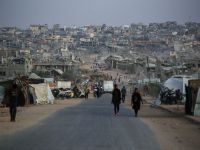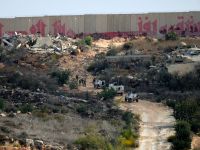Palestinian leader Yasser Arafat and Israeli Foreign Minister Shlomo Ben Ami have discussed a proposal by US President Bill Clinton to break the deadlock on reaching a peace accord, an Arab newspaper reported Saturday.
The proposal, called "Camp David Plus," would see Israel acceding to full Palestinian sovereignty over a holy site in occupied east Jerusalem in exchange for the Palestinians agreeing to renounce their demand that refugees be allowed to return to their homes, the London-based Al-Hayat reported.
It quoted sources in Israeli Prime Minister Ehud Barak's office as saying the Jewish state wanted Arafat to defer negotiations on other thorny issues such as the refugees and Jewish settlements in the Palestinian territories to a later stage.
The Camp David summit in July failed to generate a peace accord primarily because of disagreement over the future status of east Jerusalem, captured by Israel in the 1967 Middle East war, and the fate of around 3.7 million Palestinian refugees.
The Ben Ami-Arafat discussions, which took place Thursday night on the Erez Crossing between Israel and Gaza, were based on the Camp David Plus document, Al-Hayat said, and "would serve as the basis for new negotiations if it is accepted by both sides."
East Jerusalem's Old City is the site of Islam's third-holiest site, the Al-Aqsa mosque compound, and its future has been at the heart of a bitter dispute over sovereignty in Jerusalem.
Jews believe the mosque compound lies on the remnants of their most sacred site, the last Jewish temple, which was destroyed by the Romans, and Israeli policy has long been that sovereignty would never be ceded.
The refugee question, meanwhile, is focused on the future of Palestinians dispersed in Lebanon, Syria and Jordan, in addition to the Palestinian territories, a large proportion of whom are living in refugee camps.
The Palestinians have consistently demanded that any peace settlement must include their right to return to homes from which they were driven or fled following Israel's creation in 1948 and in subsequent conflicts.
The Israelis balk at this, and have only ever publicly admitted the willingness to permit the return of a token number of refugees.
A western diplomat who accompanied French Foreign Minister Hubert Vedrine on his tour of the region this week told AFP that the question of refugees appeared to be the key sticking point now, as he said the Israelis do not appear to be prepared to make any concessions on this front.
On Friday, following his meeting with Arafat, Ben Ami told Israeli public television that, "what we're doing right now, it's a common effort to reduce the violence and create conditions to restart negotiations."
The television, quoting sources close to Barak, said official negotiations would resume next week "in Washington or in the region."
US State Department spokesman Richard Boucher said Washington was exploring the possibility of holding "direct discussions between negotiators on both sides back here in Washington".
The Palestinian leadership has played down the significance of moves towards resuming peace talks with Israel, stressing that the violence continues with six more dead on Friday.
"While Israel presents certain contacts and meetings as a significant step in the peace negotiations ... on the ground the Israeli attacks continue and are increasing in ferocity, through physical elimination, state terrorism and aggression against Palestinian leaders," the Palestinian cabinet said in a statement after a meeting in Gaza chaired by Arafat -- CAIRO (AFP)
© 2000 Al Bawaba (www.albawaba.com)







